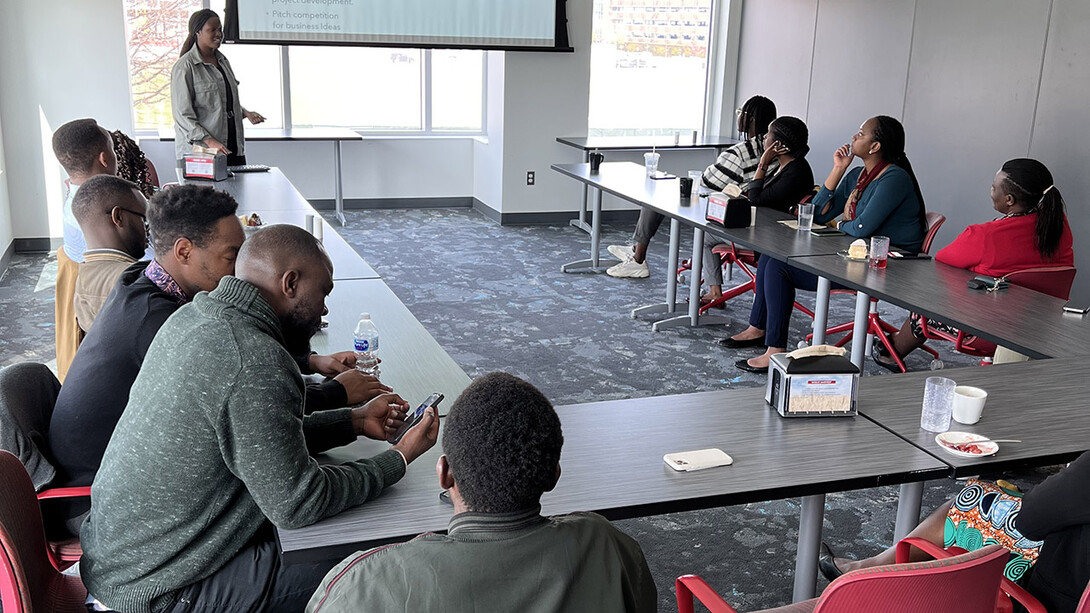
Zilfa Irakoze recently looked back on her undergraduate career in Lincoln as an international student from Rwanda and expressed gratitude.
“The support is overwhelming,” said Irakoze, a 2020 University of Nebraska-Lincoln graduate. “If you need help, somebody is there to help you.”
Irakoze was referring to the range of supports given to students participating in the CASNR Undergraduate Scholarship Program. Through the CUSP initiative, Rwandan students come to the university to study integrated science, preparing for careers across the agriculture sector in their home country.
Rwandan business and university leaders visited the University of Nebraska–Lincoln for the CUSP Career Expo April 20-22 to celebrate the program’s achievements and point to the promise the initiative holds for their country’s future.
Irakoze, now a graduate student in food science at Kansas State University, attended the Career Expo. During her undergrad years, she said, the University of Nebraska–Lincoln provided important “support and investment in helping you grow as a person, as a professional and as a student. I just felt like there was always somebody I could reach out to help me.”
Damien Niyonshuti, a current CUSP student who has been active in campus organizations including the ASUN student government, attended the Career Expo and praised the value the CUSP initiative offers him. His experience, he said, has been “incredible in terms of getting us resources to connect not only to the professors and the research, but also to what it looks like to be in a professional setting.”
Thanks to support from Husker advisers and their Rwandan partners, he said, the CUSP effort has enabled students to “really be able to connect seamlessly” with employers.
CUSP is a multi-year initiative consisting of 200 scholarships funded by the Howard G. Buffett Foundation. This May, the program will graduate the fourth of five cohorts of CUSP students.
In introductory remarks at the start of the Career Expo, Tiffany Heng-Moss, dean of the College of Agricultural Sciences and Natural Resources, described CASNR and the university’s multi-faceted efforts to extend a spirit of welcome, belonging and support for all students. Many of the CUSP scholars have been hosted by Nebraska families across the state, she said. The annual Rwanda Night event “has been a wonderful opportunity to connect our university community with Rwanda.”
“We want to be a university for all,” Heng-Moss said.
The positive spirit created by CUSP, she told the Rwandan visitors, has extended broadly across the university community and the state.
“The University of Nebraska and the state of Nebraska have benefited in so many ways from your students and the partnership with Rwanda,” she said.
“I was very much impressed” with Nebraska’s welcoming support for CUSP students, said Guillaume Nyagatare, the top administrative leader for the University of Rwanda’s College of Agriculture, Animal Sciences and Veterinary Medicine. Rwandan institutions and leaders can benefit from learning from Nebraska’s approach, he said.
“We recognize that we probably need to say, how did you do it?” he said. “And how can we also welcome them back to their own culture?”
“We’re very proactive with our students as far as their academics and checking in on them,” said Katie Forrest, an academic adviser for integrated science students.
The advisers connect students with academic resources and help them develop an in-depth plan of study to guide them toward graduation and a career path.
CUSP graduate Irakoze said that in addition to supports provided by the university, the program’s three-month junior-year fellowship in Rwanda has value by helping students connect with Rwandan companies and institutions.
In a presentation at the Career Expo, Irakoze said she aims to pursue a career in international agriculture, with connections to Africa. As a Husker undergrad, in 2017 and 2018 she represented CASNR at the World Food Prize in Iowa. Rwandan business and university leaders at the Career Expo told students they can make major contributions by pursuing careers with “impact,” bringing talent and leadership to their home country.
“We can’t do it without you,” said University of Rwanda administrator Nyagatare.
“The value of this event is to really engage with the students and see where their interests are and where they can fit in with our programs,” said Rosine Ndayishimiye, an associate with Bridge2Rwanda, a Rwanda-based partner organization with Nebraska helping CUSP students transition back into life in their home country. “We hope to be like a launch pad where many of them can come and explore a starting career in agriculture back home in Rwanda.”
Much discussion at the Career Expo focused on building entrepreneurial skills and vision. That mindset resonated with current CUSP student Niyonshuti.
“I’m very passionate about entrepreneurship, and I’m glad to see there are a lot of people here that have been really successful in terms of business, especially in Rwanda,” he said. “I want to take this opportunity to learn about how they were able to do it and see what are some of the opportunities out there and how I can tap into them.
“I’m really interested to see how we can solve problems using technology, and I’m glad the CUSP program has made this possible for me.”
One of the visiting Rwanda business leaders was Christelle Kwizera, CEO of Water Access Rwanda, which provides piped water to households. She founded her company at age 20.
“I’m here to find great people to join us on our mission,” she said. “People who want to change the world, who want to use their skills to really go out there and solve challenges in bringing access to water. That’s why we need as many passionate young people, with skills, with the right character, to come in and join the work.”
CUSP can help make possible a “transformation” of Rwanda, said Jean Claude Kayisinga, deputy vice chancellor of institutional development at the Rwanda Institute for Conservation Agriculture, a partner organization with Nebraska.
“You can help us get there,” he told the students. “We are waiting for you in Rwanda.”







